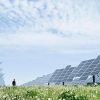Energy studies
German universities are offering around 300 courses in the field or renewable energies.

Environmental engineering, energy economics or renewable energy technology: anyone interested in studying subjects involving renewable energy at a German university has a broad range of choices. “There are about 300 courses in Germany that qualify their graduates for this growing sector,” says Theo Bühler, a labour market expert from Bonn who specializes in environment and energy. More and more universities are responding to the strong demand from companies in this sector who are looking for qualified personnel. There is a need especially for engineers and technicians, as well as for natural scientists and business specialists. In the last four years the number of courses covering renewable energies has doubled. And the number of courses offered in English with an international appeal has also increased significantly. Whereas there were just seven courses available in this field in 2007, students can now choose between more than 25 options.
An overview of courses with potential and good career prospects in the renewable energy sector:
European master in renewable energy
University of Kassel / University of Oldenburg
Study in a different European country each semester: that’s the special thing about this master programme in renewable energy. It is offered by a network of nine European universities, including the German universities of Kassel and Oldenburg. To qualify for this postgraduate course lasting three semesters, you need to be a graduate who has studied at least four years in engineering, mathematics or physics. You also need sufficient professional experience in your specialist area and a very good knowledge of English.
www.master.eurec.be/en
Wind engineering
Flensburg University of Applied Sciences / University of Kiel
Become a wind energy specialist: the master programme at Flensburg University of Applied Sciences and the University of Kiel prepares postgraduates for work in the wind energy sector in three semesters. The English-language course covers the fields of mechanics, electro-technology, economics and the environment. Entrance requirements are a first degree in engineering sciences, or several years of work experience, and a good knowledge of English.
www.fh-flensburg.de/fhfl/wind_engineering.html
Geothermal energy systems
Bochum University of Applied Sciences
The main features are geosciences, mechanical engineering, plant construction and electro-technology: the master programme at Bochum University of Applied Sciences lasts for four semesters and provides specialist knowledge in geothermal energy and its applications, and it is integrated in the civil engineering sciences. The course is interesting for civil engineers and geologists, mechanical engineers and chemists. The university cooperates with the Geothermal Center Bochum (GZB).
www.hochschule-bochum.de
Renewable energy
University of Oldenburg
From wind energy to solar technology: the course in Oldenburg is an international postgraduate programme in English extending over 16 months and is designed particularly for students from developing countries. The course combines theory with practice and case studies from the energy sector. Since 1987 more than 300 students from 70 countries have participated in the programme. The requirements are a first degree and work experience in the energy sector.
www.ppre.uni-oldenburg.de
Energy economics
University of Münster / RWTH Aachen
Technology, economics and law: the two-year master’s course in energy economics is based on this interdisciplinary mix. The course offered jointly by the Universities of Münster and Aachen cooperates with companies and organizations in the energy sector and aims to qualify people from the engineering and natural sciences as future employees and managers in the energy market. The course can also be completed in tandem with a career. The entrance requirement is a first degree in economics or a technical subject.
www.rwth-aachen.de
Biobased products and bioenergy
University of Hohenheim
The basics of crop sciences, engineering and economics for the cultivation of renewable resources and energy plants, their processing and conversion into energy: The University of Hohenheim near Stuttgart offers a bachelor course covering this range of subjects which are in high demand in this newly emerging occupational field. A good knowledge of biology, technology, economics, mathematics, physics and chemistry is important when choosing this course of study.
www.uni-hohenheim.de
Environmental planning and ecological engineering
Technical University Munich
The use of natural resources, the treatment of waste materials, the reclamation of contaminated soil and waters: these are major themes concerning students on the master’s course at Munich’s Technical University. The Programme includes not only the basics of engineering and natural sciences, but also agriculture, horticulture, forestry and planning studies. Students should have a bachelor degree when applying for this two-year master’s course.
http://portal.mytum.de
Regenerative energy sytems
Technical University Berlin
Photovoltaics, wind energy and the processing of regenerative resources: these are the main areas in the master’s course which embraces the whole spectrum of energy technologies in four semesters. Individual modules enable students to gain deeper insights into certain subjects. The programme qualifies people for a position in the energy sector, building technology, administrative bodies or scientific institutions. To take part in the course you need a bachelor degree in the area of energy or process technology, or a related field of study.
www.tu-berlin.de
Renewable energy and energy efficiency for the Mena region
University of Kassel / University of Cairo
Practice-oriented training in the fields of environment and energy for specialists from Germany, the Middle East and North Africa: this master’s programme in English is offered jointly by the universities of Kassel and Cairo. In four semesters the course covers not only areas in the natural and engineering sciences; it also enables students to discuss economic, ecological and regulatory policy aspects in the energy sector. Students attend part of the course in Cairo and a second part in Kassel.
www.uni-kassel.de
Water resources engineering and management
(WAREM), University of Stuttgart
Groundwater management and geohydrology, hydraulic engineering, water resources development and water management: this English-language master programme lasts for four semesters and conveys theoretical and practical knowledge in sustainable water management. The University of Stuttgart offers WAREM as a consecutive course which can be combined with the courses in conservation technology or civil engineering. The course also requires a good knowledge of English.
www.warem.uni-stuttgart.de
Further information is available at:
www.jobmotor-erneuerbare.de
www.studium-erneuerbare-energien.de

